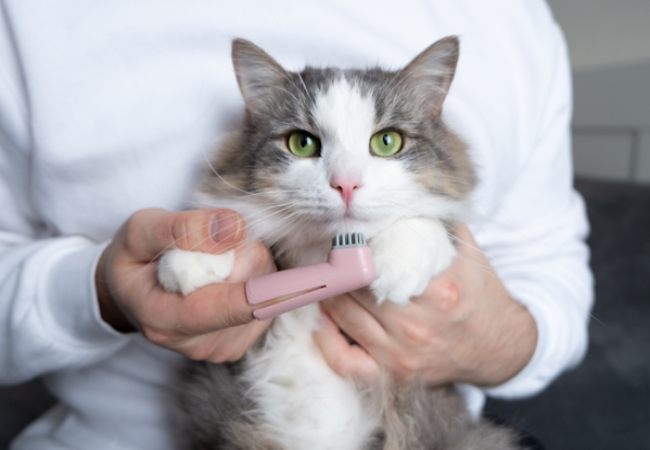Natural Dental Health for Cats Vet Approved Food, Chews & Daily Habits 2025 🐶✨

In this article
Natural Dental Health for Cats Vet Approved Food, Chews & Daily Habits 2025 🐶✨
By Dr. Duncan Houston BVSc
Dental disease affects over 70% of cats by age 3—yet it often goes unnoticed until pain, tooth loss, or infection sets in. The right food, natural chews, and home habits can dramatically reduce plaque, tartar, and vet visits.
I’m Dr. Duncan Houston, veterinarian and founder of Ask A Vet. Here's how to improve your cat’s dental health naturally—without relying solely on cleanings or prescription dental diets.
🦷 Why Cat Dental Health Matters
- Gingivitis and tartar can lead to painful resorptive lesions
- Oral bacteria can enter the bloodstream → kidney, liver, and heart disease
- Bad breath and poor grooming are often dental-related
✅ Natural Dental Support Through Food
1. Moisture-Rich, Anti-Inflammatory Diet
- Cooked or raw diets reduce the carb-based tartar buildup seen in dry food
- Low-carb, high-protein feeding supports healthier gums and saliva pH
2. Soft Bones (Vet-Guided Only)
- Raw chicken necks or wings (small portions, under supervision)
- Only for cats used to raw diets and with strong teeth
3. Dental-Safe Chews and Toys
- Dehydrated chicken strips or air-dried chew treats (single-ingredient)
- Textured lick mats
🪥 Daily Home Dental Habits
- Brush with vet-formulated cat toothpaste 3–4x/week (finger brush or gauze)
- Start slowly—let your cat lick first, then gently introduce brushing
- Wipe gums with damp gauze if brushing isn’t tolerated
🌿 Natural Add-Ons to Improve Oral Health
- Probiotics: Reduce plaque-causing oral bacteria (e.g., BLIS M18)
- Chlorophyll-rich toppers: Parsley or spirulina (tiny amounts only)
- Fish oil: Supports gum health via omega-3s
📋 Sample Daily Dental Routine
- AM: Wet food + fish oil + probiotic powder
- Afternoon: Dehydrated dental chew (supervised)
- Evening: Gum wipe or brush with enzymatic toothpaste
🛑 What to Avoid
- Dry kibble-only diets (contribute to chronic tartar buildup)
- Human toothpaste (toxic to cats)
- Hard bones or rawhide can break teeth or cause choking
📆 When to See a Vet
- Bad breath, drooling, or pawing at the mouth
- Red gums or yellow/brown tartar buildup
- Difficulty eating or sudden pickiness
🔗 Tools from & Ask A Vet
- Ask A Vet – Upload photos of teeth, feeding logs, and get vet-reviewed dental care plans
📋 Summary Excerpt
Dental disease is common—but preventable. A vet explains how to naturally protect your cat’s teeth with the right food, gentle brushing, probiotics, and daily chews.
❓ FAQs
-
Q: Do cats really need their teeth brushed?
A: Yes—even 2–3x/week can dramatically reduce tartar and gingivitis. It’s the gold standard in prevention. -
Q: What food is best for cat dental health?
A: Moisture-rich, low-carb diets like raw or gently cooked meals reduce tartar buildup far better than kibble. -
Q: Is bad breath always a dental issue?
A: Often—but it can also signal GI upset, kidney disease, or diabetes. If it persists, consult a vet.






